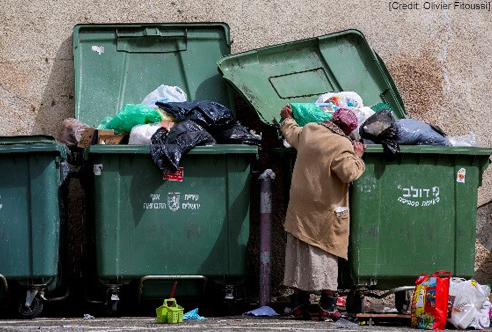David is an elderly man who recently called the International Fellowship of Christians and Jews in fear and despair. “I borrowed $1,500 from the black market in order to cover my electric bills,” he said. “I have no way to pay them back and they’re coming to my door every week threatening me. Please help.”
Although this situation might sound far-fetched, sadly, it is far from it.
David is one of the tens of thousands of elderly in Israel who live alone in debilitating poverty, and each month desperately tries to spread out the $500 state stipend he receives to cover all of his bills.
“I live on the top floor of an old apartment building without an elevator, I take half of the medicine that my doctors prescribe me, and I only take a hot shower once a week,” he told me.
“I have cut back in every place possible and have come to the conclusion that I simply can’t survive on the income I have. I borrowed money so that my electricity wouldn’t be shut off, but now I can’t pay it back. It’s better to die than to live like this,” David said in despair, which is a heartbreaking sentiment I have heard far too many times from poor elderly Israelis.
The government’s Poverty Report for 2014 was released recently, confirming the reality every nonprofit in the Holy Land knows all too well: that David’s desperate situation is not out of the ordinary, nor a problem that is going to go away by itself. The report documents that more than 1.7 million Israelis live below the poverty line, yet almost all independent studies have shown that to be a very conservative number. The reality on the ground is that more than 25 percent of Israelis live in poverty, and no one is immune.
For years I have been asking myself how the statistics continue to worsen when it comes to the social welfare of Israel’s people. How do we have elderly who are so desperate that they dream of dying? How do we have a surplus of food, yet children who go to sleep hungry? More than 12 years ago, my father, Rabbi Yechiel Eckstein, identified this problem and, in response, immediately opened up The Fellowship offices in Jerusalem.
Because of our generous donors, The Fellowship is able to help these destitute people who live in these conditions with next to nothing. If I had to summarize what makes the people of Israel extraordinary, it would be that we all feel responsible for one another. When there is an attack, everyone runs toward the scene to help. When young men or women orphaned by attacks get married, the entire country celebrates with them. When a child falls, everyone on the street stops to help him get up.



